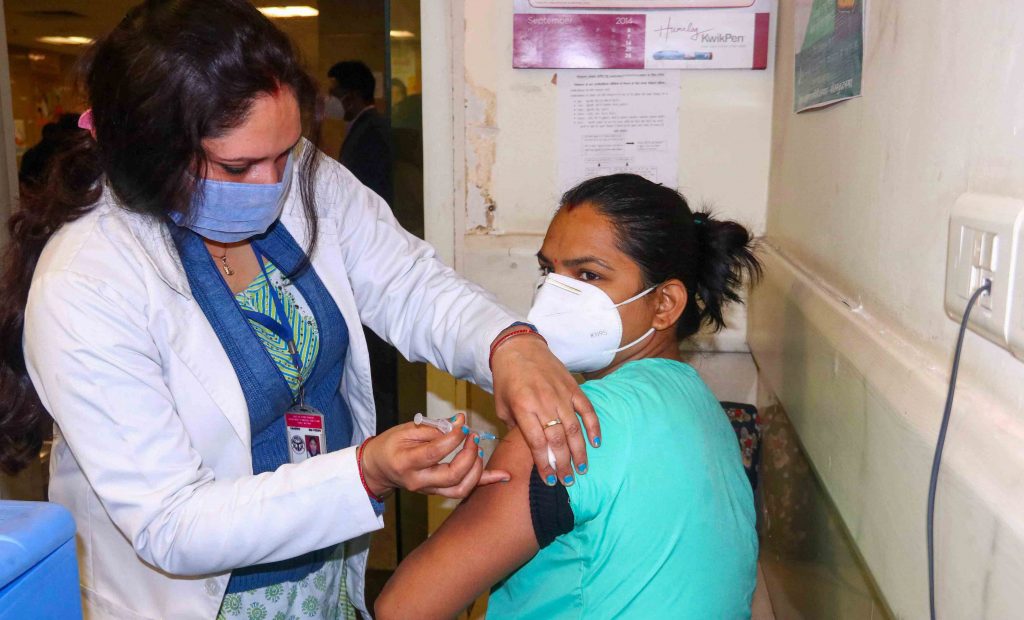New Delhi: Prime Minister Narendra Modi announced Monday that the central government will bear the expenses of vaccinating nearly three crore healthcare and frontline workers in the first round. The prime minister suggested that public representatives, a reference to politicians, should not be part of this initial exercise.
Interacting with state chief ministers, Modi underscored the enormity of what he described as the world’s biggest vaccination exercise, which begins from January 16. He said over 30 crore citizens will get the jabs in the next few months in India against only 2.5 crore people vaccinated so far in over 50 countries in around a month.
The prime minister also sought to dispel concerns expressed by some opposition leaders and experts over the approval given to Covaxin without the availability of efficacy data. He asserted that scientists have taken all precautions to provide citizens with effective vaccines. Modi said he has been maintaining from the beginning that the scientific community will have the final word on the issue.
India’s drug regulator has given nod to Covishield and Covaxin for emergency use authorisation.
“It is a matter of pride that both the vaccines are ‘made in India’. One can imagine how much hardship India would have faced if it had to depend on foreign vaccines,” Modi stated.
Talking about the COVID-19 situation Modi said India is in a much better place than many others in terms of the pandemic’s spread, and added that this is a matter of happiness but should not induce carelessness.
The panic visible among the people six-eight months back is no longer there, and the increasing confidence among them in the fight against the pandemic has had a positive impact on economic activities as well, the prime minister pointed out.
Modi also asked states to ensure that rumours do not get spread about the vaccination exercise and suggested involving social and religious groups in helping check any rumour-mongering. He said many states have given good suggestions in fighting the pandemic and the dialogue and cooperation between the Centre and states have been a ‘great example’ of federalism.
After healthcare and frontline workers totalling about three crore, priority will be given to those above 50 years of age and the under-50 population groups with co-morbidities, together numbering around 27 crore, in the next phase.
According to the Health Ministry guidelines on COVID-19 vaccination, the latest electoral roll for Lok Sabha and Legislative Assembly elections will be used to identify the population aged 50 years or more.
At least seven other vaccines are being developed in India, while some others can be imported from abroad, including the one developed by global pharma giant Pfizer which has already applied for import and sale in India of its vaccine for emergency use authorisation.
India’s total active caseload has fallen to 2.25 lakh, which accounts for just 2.13 per cent of the total number of coronavirus cases in the country at over 1.04 crore, according to the latest Health Ministry data. More than 1.5 lakh have died so far.
The vaccination drive in India is starting almost a year after the first case was reported January 30, 2020 in Kerala, though a wider outbreak began in March when a few people in Delhi and adjoining areas tested positive after returning from abroad.
Modi said the most important factor in this vaccination drive is the identification and monitoring of those who need to be vaccinated.
For this, Co-Win digital platform has been created, he said, adding that beneficiaries will be identified with the help of Aadhaar and timely second dosage for them will also be ensured.
After a person receives the first dose of vaccination, Co-Win will immediately generate a digital vaccination certificate. This certificate will also act as a reminder for the second dose, after which, a final certificate will be given, he said.
